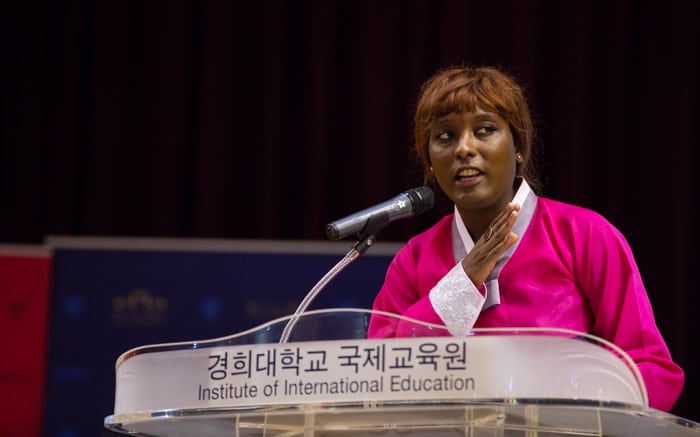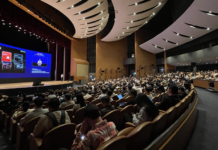By Min Yea-Ji and Kim Young Shin
Photos = Kim Sunjoo
Video = Lee Hana, Choi Tae-soon
Seoul l May 12, 2018
Non-native Korean speakers from around the world gathered at Kyung Hee University in Seoul on May 15 to compete in their ability to speak the language, on the 621st anniversary of the birth of King Sejong the Great, the monarch who oversaw the creation and propagation of the indigenous Hangeul alphabet.
The final rounds of the 21st World Korean Language Speech Contest for Foreigners, hosted by the Institute of International Education at Kyung Hee University and sponsored by the Ministry of Culture, Sports and Tourism, was held in the campus’ Crown Concert Hall. The 16 finalists from 12 countries, from among the original 1,195 participants from 55 countries, shared their own perspectives on “Korea’s status in the international society” and on the “Secret charms of Korea.”
The contestants seemed to have forgotten about the hot weather that day as they passionately prepared for the final stages of the competition. Some 700 non-Korean audience members came out to support their friends and family members, there to learn more about the competition, entered the venue with a glow of excitement on their faces as they fanned their hands to cool off.
Many of the finalists pointed out that the concept of the collective self, or woori (우리), and the act of being friendly and having a warm heart (정, 情), were both highlights of their time studying Korean and living in Korea.
Malaysian contestant Lau Zi Ching, who has studied and worked in Korea for eight years, said, “Someday, I will return to Malaysia and the thing I’ll miss most about Korea won’t be the tourist spots or the food, but the warm heart I shared with my teachers, colleagues and friends.”
“With the power of the collective self, people overcome hardships together and share their happiness,” said Abdushukurov Olimjon from Uzbekistan who stood at the podium in a Korean football uniform. “I, too, feel Korea through the concept of ‘woori.’ I support the Team Korea athletes who represent our continent.”

Leyla Bah, winner of the 21st World Korean Language Speech Contest for Foreigners at Kyung Hee University, speaks about the order of rank that exists in Korean society, during the final rounds of the competition, in Seoul on May 15.
One of the contestants, Leyla Bah from France, said that one of the secret charms of Korea is its social stratification, which is often regarded as being uncomfortable to native Koreans. She spoke about the ways in which people in Korea give preferential treatment to older people in the work place, or to elders in general.
“Compared to Korea, the Western world is vague in terms of human relationships,” she said. “It’s usually unclear how to act in the community and it creates awkward moments. The clear order and rank in Korea rather helps to keep your emotional stability.”
Other participants spoke about Korea’s expressway rest areas and the wonders that are Korean swear words, all with loving emotion, and that they both are some of the secret charms of this country.
Korea’s high tech and its pop music and TV shows were also popular topics, and were mentioned as factors as to why Korea is so well known among the international community.
Yuhei Kawasaki from Japan praised the expansive internet connection that even exists in small restaurants or cafes, and noted the convenience of using credit cards in Korea.
“In the past, people in Egypt often could tell South and North Koreans apart. Some only recognized Korea as a country that eats dogs,” said Egyptian participant Abdelwahed Sherok Ahmed Sayed. “Now, there are many K-pop fans in Egypt. Also, many people see Korea as a leader in the world economy, especially in terms of technology and education.”

The finalists in the 21st World Korean Language Speech Contest for Foreigners pose for a group photo.
The grand winner was Leyla Bah, a French contestant who talked about Korea’s social stratification while wearing traditional Hanbok attire. After winning, she said, “I’m happy because it feels like my years of passion for the Korean language have gotten rewarded today. I want to use the prize to learn Korean even more.”
She also appeared on stage during a special performance of traditional pansori lyrical signing and danced with a folding fan in her hand.
The second prizes went to Nguyen Thi Hong Hanh from Vietnam and to Mirzoaliev Khushnud from Tajikistan.
“At this competition, we got to hear how non-Koreans feel about the country and share different ideas between Koreans and non-Koreans,” said Hong Yun-ki, the dean of the Institute of International Education of Kyung Hee University.
jesimin@korea.kr























